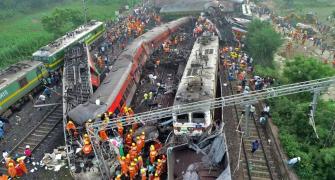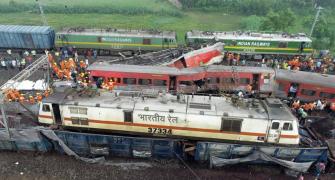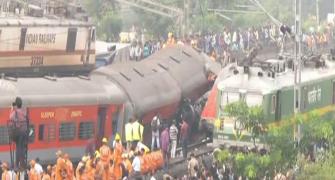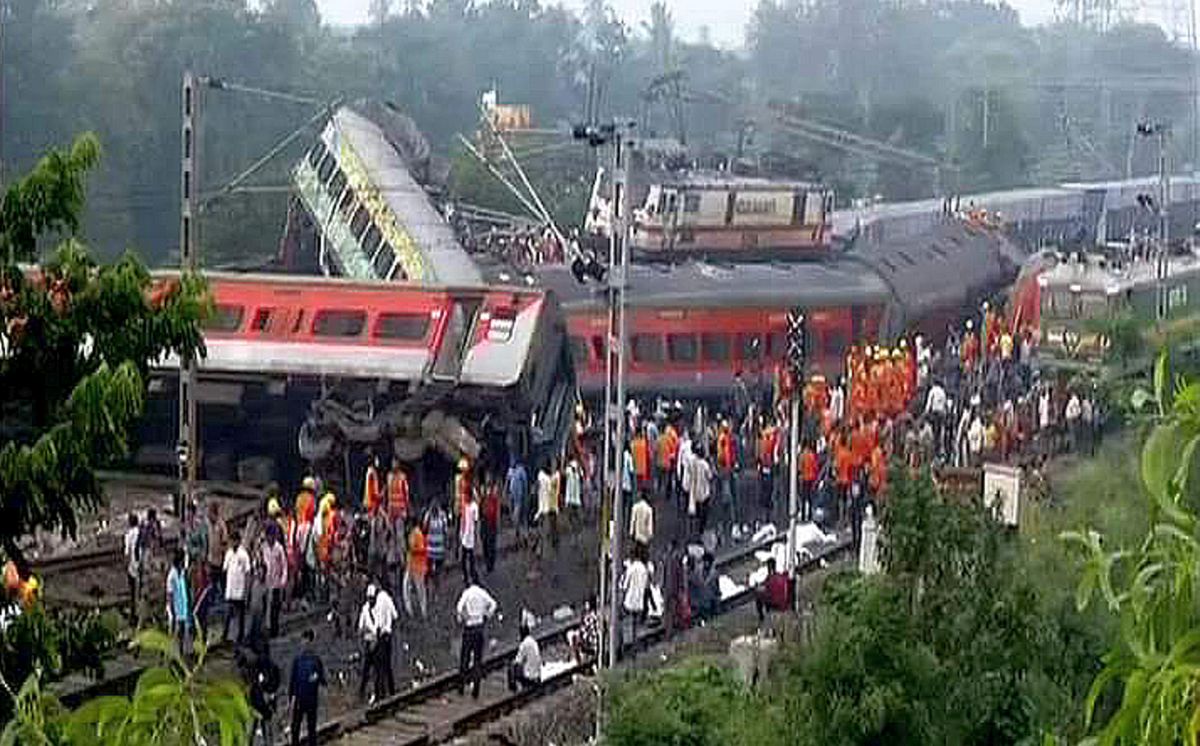'We don't know how and why this happened as the route interlock signal works fine millions of times every day across India.'

Three days after the tragic triple train accident in Odisha that claimed 288 lives, there are more questions than answers on how and why it happened.
All kinds of theories are floating about, right from sabotage to long working hours for railway drivers to signal failure that could have led to the accident.
So, what may have caused the accident and what could have been done to prevent it?
Syed Firdaus Ashraf/Rediff.com spoke to Prashanta Nanda, a member of the Parliamentary Standing Committee on Railways and a Rajya Sabha member of the Biju Janata Dal from Odisha, to know more.
What could have been done to prevent the rail accident in Odisha?
The first and foremost thing is that you must know how this accident happened and only after which can we talk about prevention.
The accident happened at Bahanagar station where there are two main lines for trains to pass through called 'up' and 'down' main lines. And then you have two side tracks called loops. This is used for stopping trains temporarily.
Now some time before the accident a goods train was accepted into the loop. Once this goods train was in, the switch was moved to point the main line from a route relay panel. This route relay panel accepted the train in the main line.
Signals along the track are inter-linked to the panel to guide the loco pilot whether to slow down or continue.
In this case, the switch did not move back correctly, thus still pointing out to the loop, but relayed to the panel that it is set back to the main line.
Accordingly, the signals of the main line turned green, showing all clear.
The loco pilot of the Coromandel Express sees the green signal on the main line and continues to drive the train at the maximum permitted speed limit of 130 km per hour.
However, since the switch is set towards loop, the train tries to enter the loop at such high speed and in the process derails.
The locomotive and several coaches of the Coromandel Express smash into the goods train while some coaches spill over to the adjacent down line track. This impact causes a lot of casualties.
And to make things worse, another train from the down line (the Yeshvantpur-Howrah Superfast) was coming on the main track and whatever chance was there of survival goes into thin air as there is another accident at the same time then and there. This made things worse.
The preliminary report too says this, but was it a technical error or a human error...?
Whether it is a technical error or human error is a million dollar question now.
Right now, it looks like a technical error, but it could be a human error too.
This is a matter of inquiry and therefore it is ordered.
What about Kavach? People said lives could have been saved.
Kavach is meant to stop the train if it senses another train on the same track. Kavach cannot sense a switch set wrongly or it cannot stop a train from derailing.
How could the switch be set wrong into a green signal? Is there no fail-safe? That is also a question that needs to be asked.
We don't know how and why this happened as the route interlock signal works fine millions of times every day across India.
Why did it fail this one time? We don't know the answer yet.
Rail drivers are said to work more than 12 hours a day. Questions are being asked if the fatigue factor sets in for them, resulting in accidents?
The fatigue factor of drivers makes no sense in this accident.
The driver saw the green signal and he drove according to the signal. He continued at 130 km per hour speed as the Bahanagar station was not a stoppage station.
You cannot blame the fatigue factor of the driver for the accident.
If the train is not given the main line signal, what can a driver do? There is no time for him to stop the train because it has already got into the loop where a goods train is stationed. No driver could have stopped the train at this high speed.
One report said that derailments of trains have been on the rise, from 257 in 2017-2018 to 399 in 2019-2020. Did the government not pay much attention to derailments?
These are the questions and some more questions that have come to mind which will be taken up by the inquiry committee. The answer will come only after a proper inquiry is done.
We are far away from Bahanagar railway station, and we will not know how the accident happened right now as we will have to wait for a detailed inquiry.
We have seen tremendous progress in the Vande Bharat Express but some sections believe the government is more interested in elite train travel.
We have been told trains which run faster, for them the tracks are being changed. This is done to suit the speed of these new trains.
When we are flagging one Vande Bharat train to go, we are sure our railway tracks are absolutely prepared to carry on with that speed. There is no problem with it.
It is not the speed of this accident, but the particular place where this happened.
If the signal was given green to the main line, there would have been no problem and no accident. This system is functioning smoothly across India right now without any problem.
But at this accident site one needs to question how it happened and why it happened.
This electronic system (of signalling) is a fool-proof system and now the question that we need to ask is whether we need another set of systems; it is a matter of discussion and then to decide.
CAG reports have flagged multiple shortcomings for train derailments, yet no action was taken by the government or the railway ministry. Rs 1 lakh crore was to be deposited for derailment funds, but the government did not deposit more than Rs 5,000 crore.
This is another subject which we can discuss some other day. Right now, we are emotionally charged with this particular accident.









